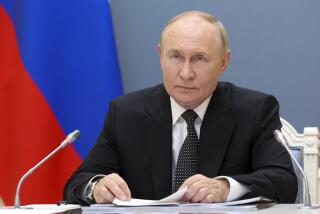Pledges Not to Prosecute Soldiers Freed by Afghan Rebels : Kremlin Reverses Policy on POWs
- Share via
MOSCOW — In an effort to heal the wounds of its long involvement in the Afghan war, the Soviet Union reversed its military policy and pledged Monday not to prosecute any soldier who was captured by Muslim rebels.
Maj. Gen. Valentin P. Khrobostov, one of the Soviet armed forces’ top political commissars, said in an appeal for the prisoners’ release: “No one is going to be punished. No one will be prosecuted.”
The pledge was intended to counter what Soviet officials said had been efforts to persuade those soldiers held by the Afghan moujahedeen not to return to the Soviet Union by telling them that former prisoners of war would be charged here with desertion, collaboration with the enemy or treason and sent to penal colonies or even executed.
“Nothing of the kind will happen to them,” Khrobostov said. “On the contrary, everything will be done to help them come home, to settle themselves and to lead normal lives.”
The question arises because, after World War II, more than 1.5 million Soviet soldiers, freed from the Nazis, went directly into prison camps on their return home--and tens of thousands were executed--in the belief that they should have fought to the death.
The Soviet Union now has “a fundamentally new attitude to POWs than we did during World War II, an entirely new approach,” another official said, “and no punishment will be meted out.”
Khrobostov estimated that as many as two-thirds of the 311 soldiers listed as missing in action are still alive and being held by the moujahedeen in Afghanistan or Pakistan.
As it withdraws its 100,300 troops, half of whom are to be out of Afghanistan by Aug. 15 under an agreement reached in April, the Soviet Union is launching an international campaign to free those soldiers held prisoner.
The MIA issue is already one of great political sensitivity as the Soviet Union tries to forget a war that most people here seriously question and many regard as a tragic blunder.
Letters, some offering money to help ransom the soldiers, are pouring by the hundreds into the newspaper Literary Gazette, which first drew attention to the prisoners’ plight.
“People want this war to be over, and it won’t be over, they feel, until all our boys are home,” said Alexander D. Sabov, the newspaper’s foreign editor. “They also feel that, if the war was a blunder, these boys should not be made to suffer further for it. They want them home.”
Soviet leader Mikhail S. Gorbachev pledged a maximum governmental effort to find the prisoners and secure their release, and Moscow is now mounting a major international campaign that recalls U.S. measures to learn the fate of its missing soldiers after the Vietnam War.
But a major effort also will be made to persuade the soldiers themselves to come home rather than to go to the United States or Western Europe, where groups of Soviet emigres are promising to resettle them and warning that they face punishment if they return to the Soviet Union.
“We would like to say that such fears have no foundation,” Sabov said, “but we have to acknowledge that there was a time in the Stalinist era when these things did happen. . . . What we want to say is that is no longer so.”
After World War II, an estimated 60% to 80% of the 2.3 million Soviet prisoners who were repatriated from German-held territory were sent to labor camps or into internal exile on their return home, and perhaps 5% to 10% were executed, often summarily by the secret police or army political commissars.
According to his Soviet and Western biographers, Josef Stalin, the Soviet wartime leader, reasoned that no loyal Soviet soldier, let alone an officer, would have allowed himself to be taken prisoner and thus those who did not fight to the death had betrayed the country.
More to Read
Sign up for Essential California
The most important California stories and recommendations in your inbox every morning.
You may occasionally receive promotional content from the Los Angeles Times.













